ASRock Rack EPC621D4I-2M Motherboard CPU Benchmark
For this exercise, we are using our legacy Linux-Bench scripts which help us see cross-platform “least common denominator” results we have been using for years as well as several results from our updated Linux-Bench2 scripts. At this point, our benchmarking sessions take days to run and we are generating well over a thousand data points. We are also running workloads for software companies that want to see how their software works on the latest hardware. As a result, this is a small sample of the data we are collecting and can share publicly. Our position is always that we are happy to provide some free data but we also have services to let companies run their own workloads in our lab, such as with our DemoEval service. What we do provide is an extremely controlled environment where we know every step is exactly the same and each run is done in a real-world data center, not a test bench.
Python Linux 4.4.2 Kernel Compile Benchmark
This is one of the most requested benchmarks for STH over the past few years. The task was simple, we have a standard configuration file, the Linux 4.4.2 kernel from kernel.org, and make the standard auto-generated configuration utilizing every thread in the system. We are expressing results in terms of compiles per hour to make the results easier to read.
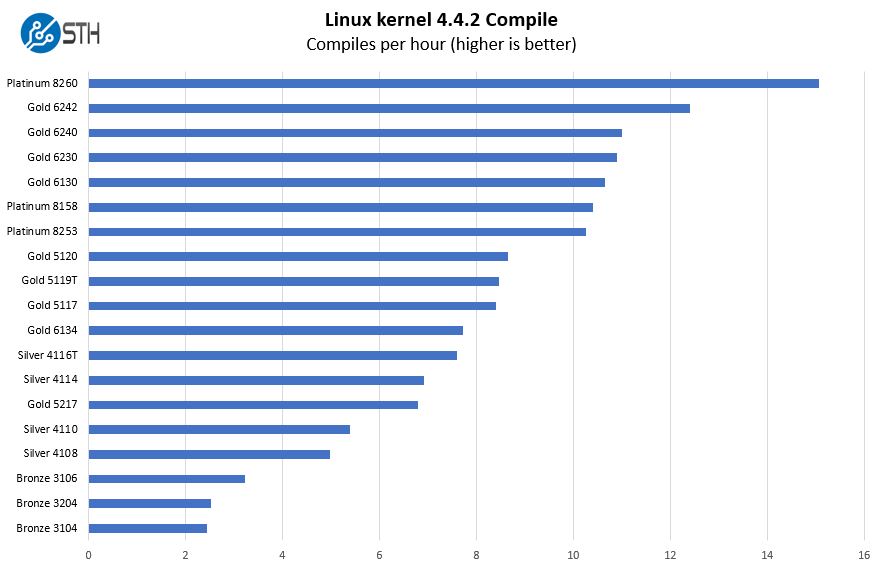
We are showing several different CPU options for the ASRock Rack EPC621D4I-2M. We think that the most common will be 2nd generation Intel Xeon Scalable CPUs, but we have a limited number of the newer CPUs so we are showing seven of the new SKUs plus a dozen older SKUs here. We wanted to get this review complete instead of waiting for some of the higher end SKUs like the Intel Xeon Platinum 8280 and Platinum 8276L CPUs available. Still, we think in this mITX form factor, the Xeon Bronze, Silver, and Gold SKUs will be the most popular.
c-ray 1.1 Performance
We have been using c-ray for our performance testing for years now. It is a ray tracing benchmark that is extremely popular to show differences in processors under multi-threaded workloads. Given the speed of this generation of CPUs, our older generation 4K results did not show a large enough difference between CPUs. Instead, we are using our Linux-Bench2 8K results to show differences.
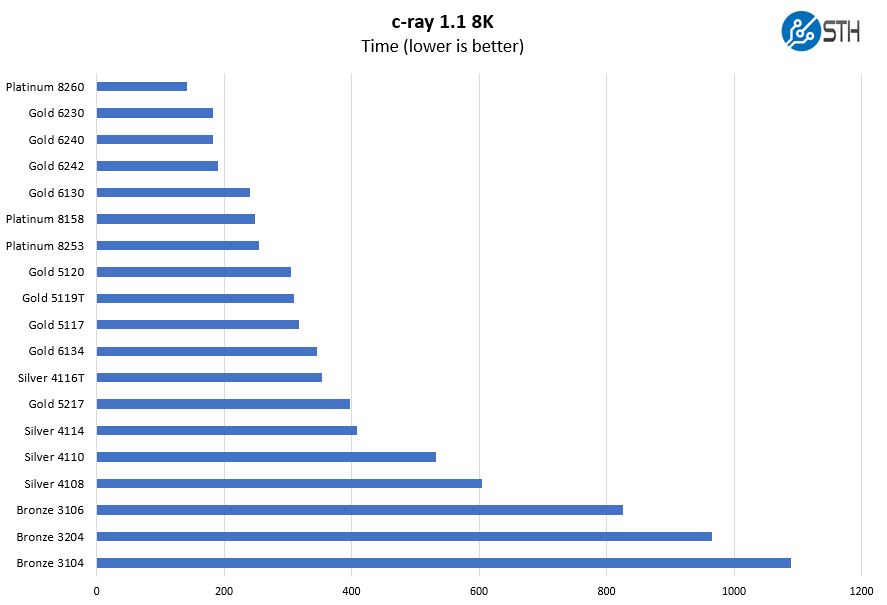
Here one can see the wide range of CPUs that one can put in the ASRock Rack EPC621D4I-2M platform. Even without the $7-16K Platinum SKUs, we are seeing around 9x scaling from top to bottom.
7-zip Compression Performance
7-zip is a widely used compression/ decompression program that works cross-platform. We started using the program during our early days with Windows testing. It is now part of Linux-Bench.
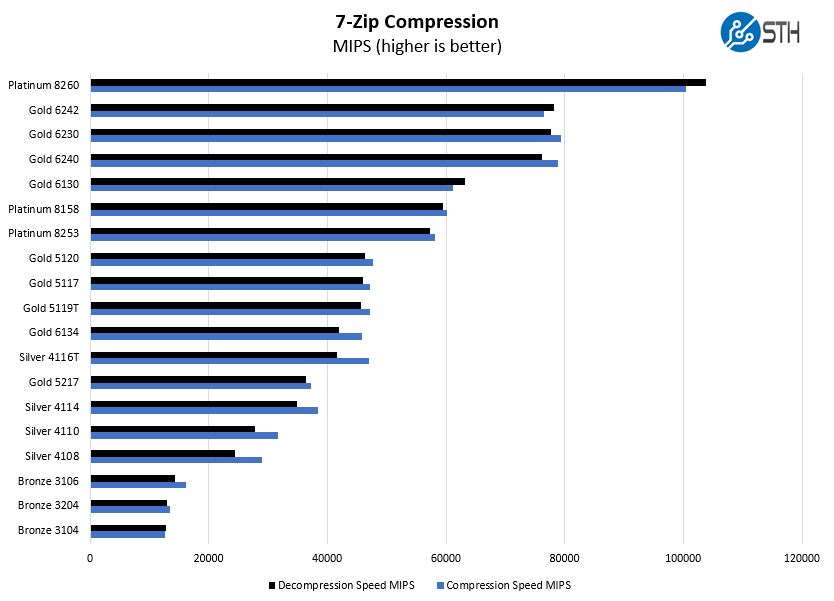
Compression is important since we can see these platforms being used for storage servers. Here, the Intel Xeon Silver line has a lot to offer.
NAMD Performance
NAMD is a molecular modeling benchmark developed by the Theoretical and Computational Biophysics Group in the Beckman Institute for Advanced Science and Technology at the University of Illinois at Urbana-Champaign. More information on the benchmark can be found here. We are going to augment this with GROMACS in the next-generation Linux-Bench in the near future. With GROMACS we have been working hard to support Intel’s Skylake AVX-512 and AVX2 supporting AMD Zen architecture. Here are the comparison results for the legacy data set:
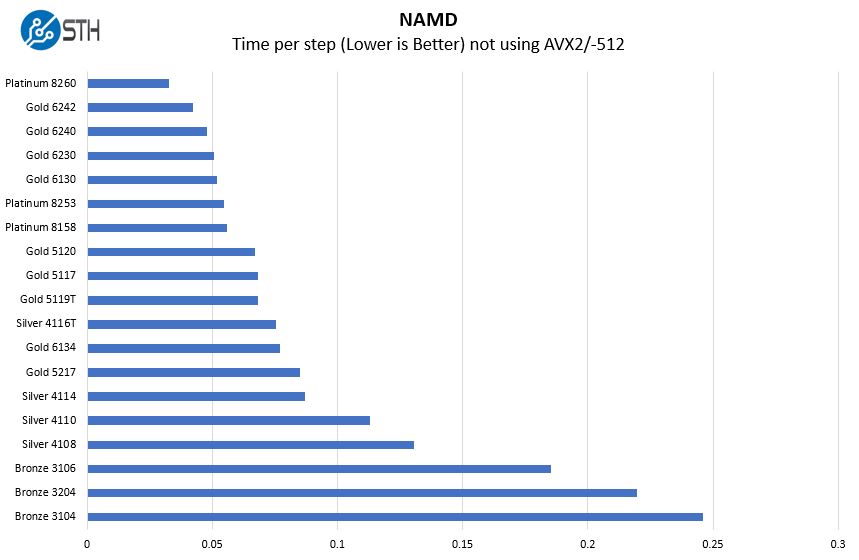
On the NAMD side, we can again see the impact of adding many more cores by stepping up from the Intel Xeon Bronze to the Intel Xeon Silver line.
OpenSSL Performance
OpenSSL is widely used to secure communications between servers. This is an important protocol in many server stacks. We first look at our sign tests:
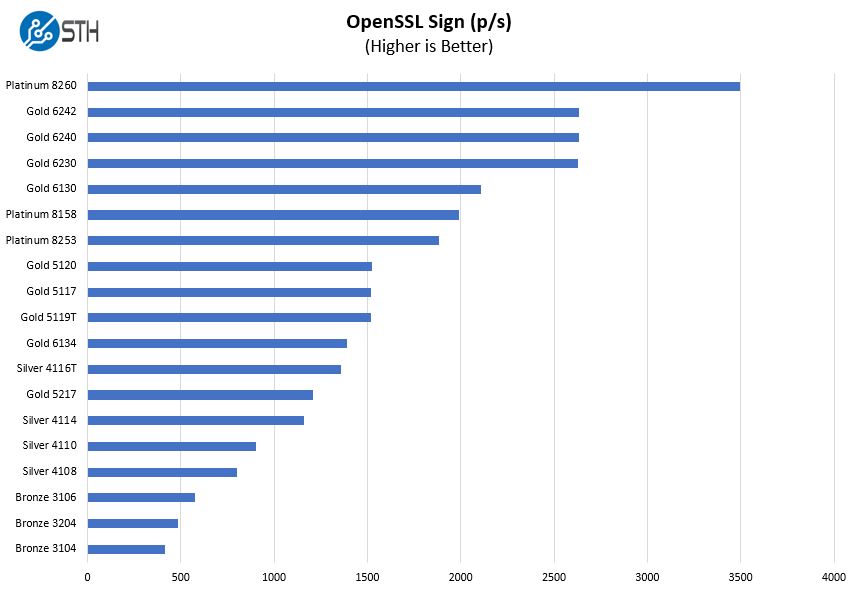
Here are the verify results:
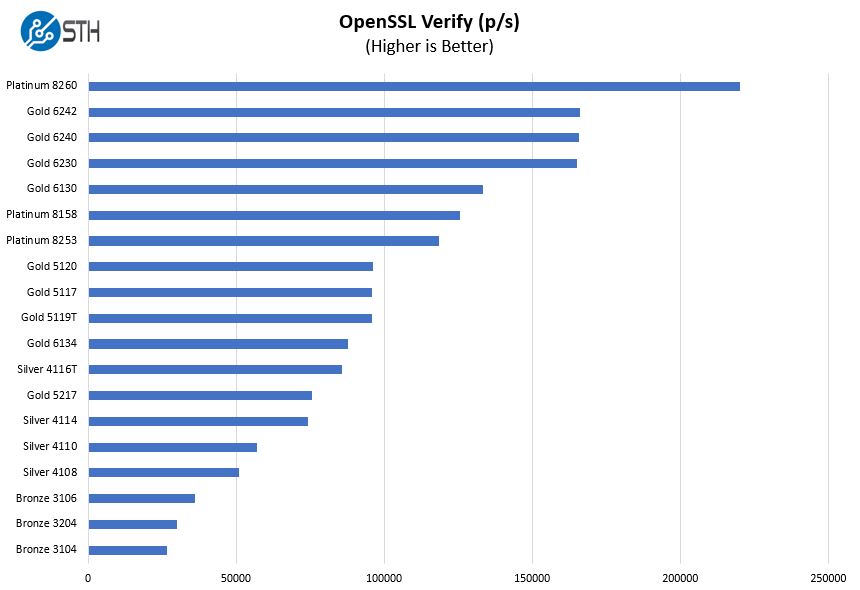
If we were to compare these numbers to something like an Intel Xeon E-2136 that is commonly fit into a mITX form factor, one can see that the scaling potential is well beyond what other servers in this form factor can offer.
UnixBench Dhrystone 2 and Whetstone Benchmarks
Some of the longest-running tests at STH are the venerable UnixBench 5.1.3 Dhrystone 2 and Whetstone results. They are certainly aging, however, we constantly get requests for them, and many angry notes when we leave them out. UnixBench is widely used so we are including it in this data set. Here are the Dhrystone 2 results:
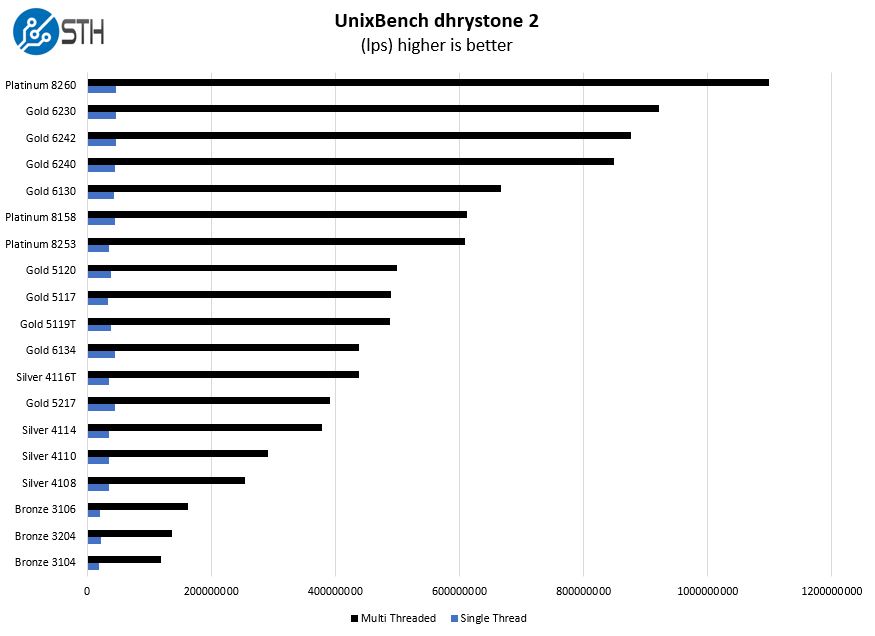
And the whetstone benchmarks:
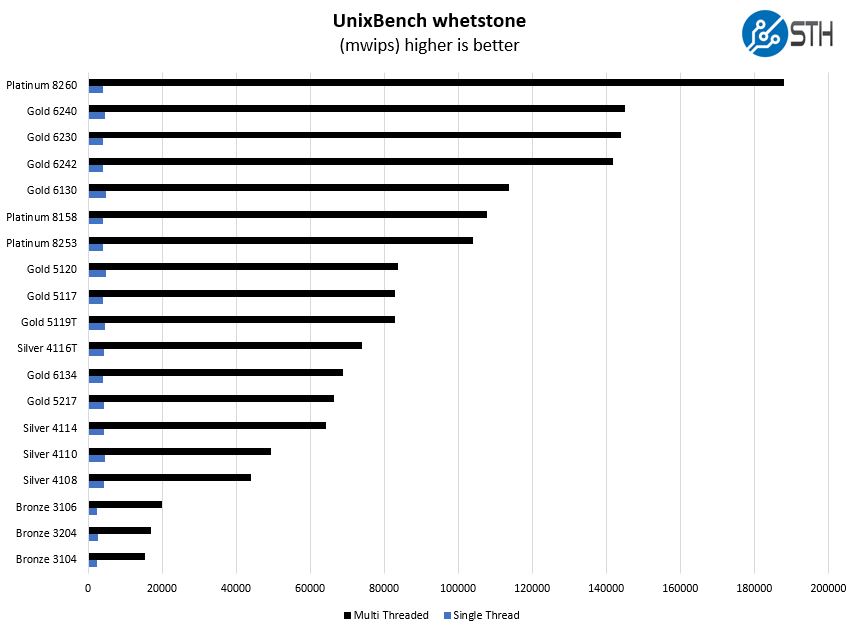
Here one can see solid scaling again. We know a lot of dedicated and VPS hosting providers use this to gauge relative performance when selecting nodes based on those who have contacted us.
GROMACS STH Small AVX2/ AVX-512 Enabled
We have a small GROMACS molecule simulation we previewed in the first AMD EPYC 7601 Linux benchmarks piece. In Linux-Bench2 we are using a “small” test for single and dual socket capable machines. Our medium test is more appropriate for higher-end dual and quad socket machines. Our GROMACS test will use the AVX-512 and AVX2 extensions if available.
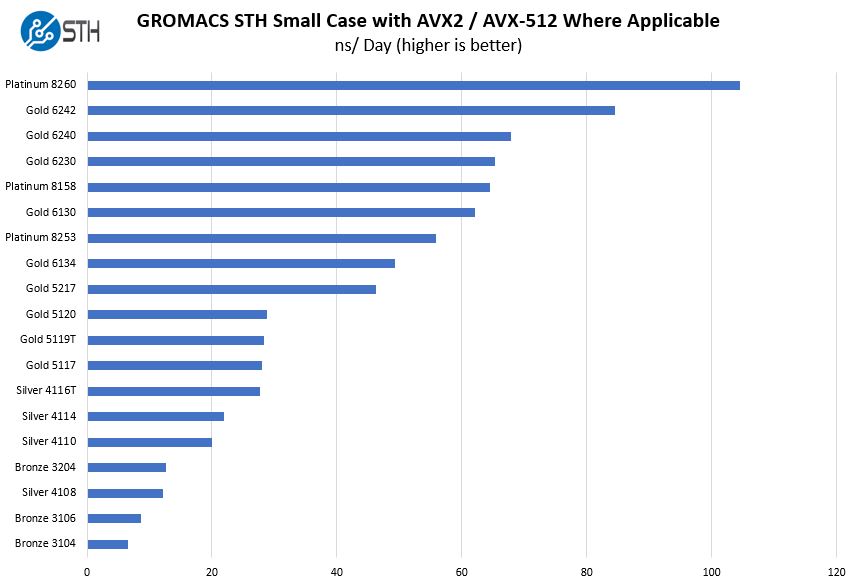
One of the key advantages using an Intel Xeon Scalable CPU is the performance we get with AVX-512 enabled on the current generation. Compared to the current Intel Xeon E-2100 series, the LGA 3647 parts are much faster. We should also note here that another new instruction, VNNI in the 2nd generation Intel Xeon Scalable platform may be something to look at if you are a software/ appliance provider thinking about using VNNI for edge inferencing in an ASRock Rack EPC621D4I-2M powered server or appliance.
Chess Benchmarking
Chess is an interesting use case since it has almost unlimited complexity. Over the years, we have received a number of requests to bring back chess benchmarking. We have been profiling systems and are ready to start sharing results:
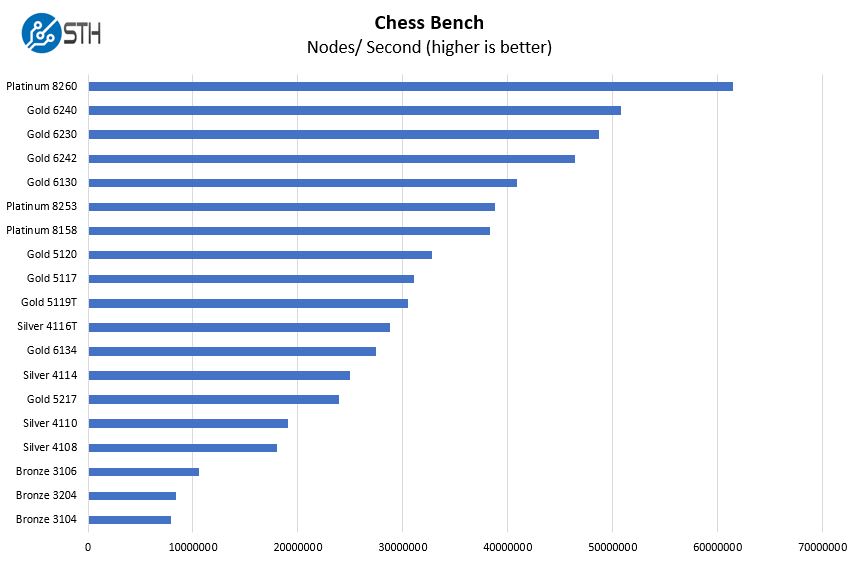
This sees a more traditional scaling chart. With the big cores, one can fit a lot of nodes in a tight space. On the other hand, cooling for the higher TDP CPUs in this platform will present a challenge that must be addressed and one has very limited memory capacity.
Next, we are going to look at the power consumption before getting to our final thoughts.


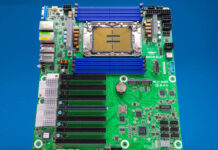
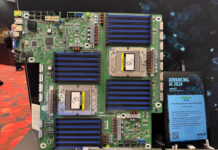
Pls review ASRock Rack D2143D4I2-2T or Supermicro Edge Computing/Gateway lineup like SuperServer E403-9D-8CN-FN13TP with X11SDW-8C-TP13F.
“We wanted to get this review complete instead of waiting for some of the higher end SKUs like the Intel Xeon Platinum 8280 and Platinum 8276L CPUs available”
while all of my skylake-sp supports UDIMM, my Cascade-Lake-SP don’t support UDIMM.
in theory this can’t work…
aus dem ASRock Rack PDF(EPC621D4I-2M – EPC621D6I)
“4 DIMM slots, Supports Quad Channel DDR4 2993/2666/2400 ECC SO R DIMM, ECC SO DIMM, and non-ECC SO DIMM (Max. 64GB)”
Es gibt SO R DIMM ????? wo ?
Hello Patrick,
There is some confusion regarding the ILM of this socket. You mention that it is square and even reference the Dynatron B13. the folks from ASRock Rack and Dynatron were saying that it was a narrow ILM. Can you confirm which type that MB uses?
Thanks,
jp
I will send William a note but I think it is narrow.
thanks. I also noticed in one of the pics of the bottom that it is stamped as narrow.
Small but performance is powerful motherboard for itx board
just finished a build using this mb. it is for a specific device that is used for traffic generation and focused on low noise and sff. see link below for pics:
https://imgur.com/a/NU2mHq8
jp
ASRock Rack ROMED8-2T has any one done a review of this 7 PCIe 4.0x 16 motherboard?